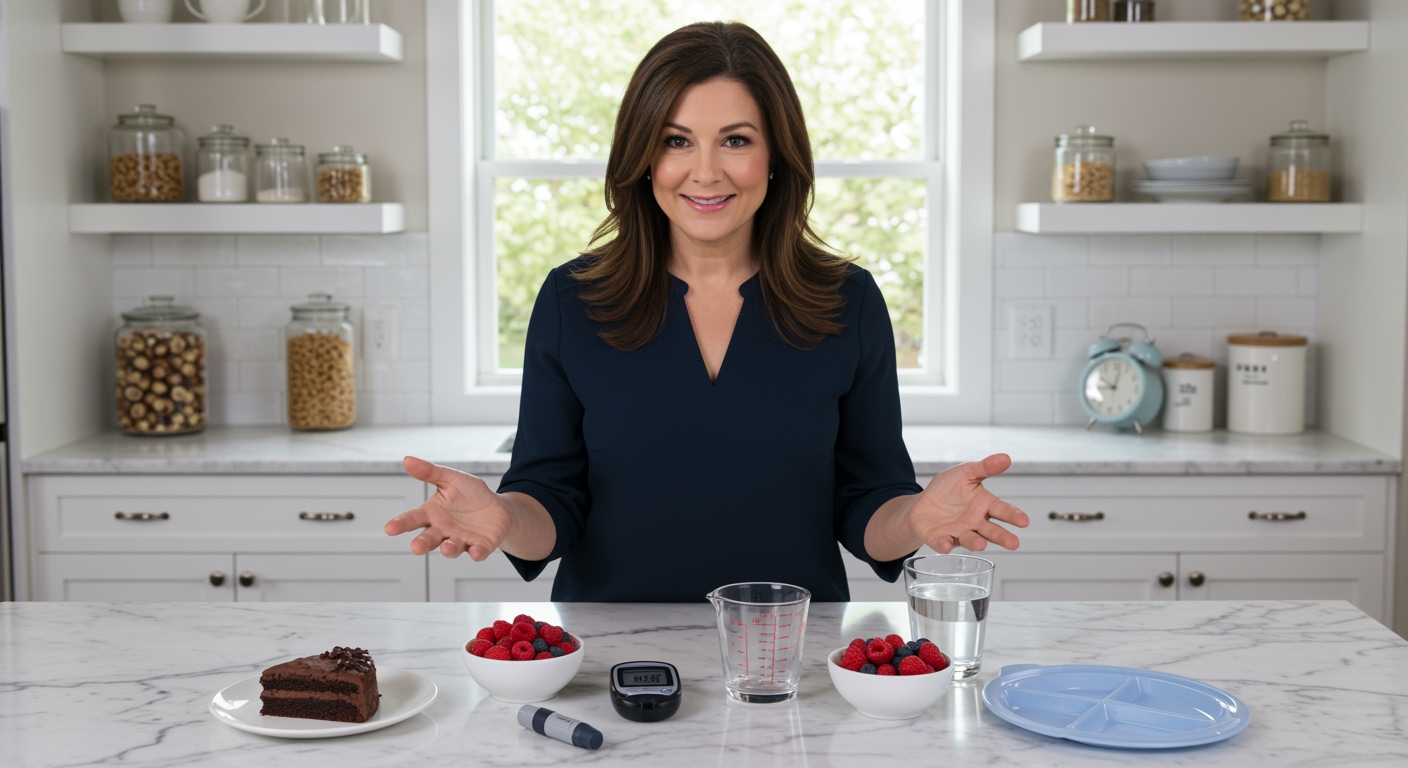✪ Key Takeaway: Cake is not inherently bad for PCOS when eaten in small portions at the right time with proper blood sugar management.
Introduction
You stare at that birthday cake and wonder if one slice will send your PCOS symptoms into overdrive.
Most women with PCOS feel guilty about eating cake because every article tells them to avoid sugar completely.
Hi, I’m Abdur, your nutrition coach and today I’m going to explain why cake is not the PCOS villain you think it is when you understand timing and portions.
How Does Cake Actually Affect PCOS Symptoms?
Cake contains refined sugar and flour that cause rapid blood glucose spikes in women with PCOS.
Your body responds to this sugar rush by releasing large amounts of insulin to bring blood sugar back down.
Women with PCOS already have insulin resistance, which means their cells do not respond well to insulin signals.
This creates a cycle where your pancreas produces even more insulin to compensate for the poor cellular response.
High insulin levels trigger your ovaries to produce excess androgens like testosterone, worsening PCOS symptoms.
However, research shows that occasional sugar intake does not cause permanent damage when blood sugar returns to normal levels.
✪ Fact: One study found that women with PCOS who ate dessert occasionally had similar long-term outcomes as those who avoided it completely.
When Is The Best Time To Eat Cake With PCOS?
Timing plays a crucial role in how your body processes cake when you have PCOS.
Your insulin sensitivity is naturally highest in the morning and after physical activity.
Eating cake within 30 minutes after a workout allows your muscles to use the sugar for recovery instead of storing it as fat.
Your body also handles sugar better when eaten with or after a protein-rich meal that slows digestion.
Avoid cake late at night when your insulin sensitivity drops and your body prepares for sleep.
Weekend mornings after a good night’s sleep provide the best metabolic conditions for processing occasional treats.
✪ Pro Tip: Eat cake after a protein-rich breakfast to minimize blood sugar spikes and improve insulin response.
What Portion Size Works For PCOS Management?
Portion control becomes critical when managing PCOS because your body cannot handle large amounts of refined carbohydrates efficiently.
A reasonable cake portion for women with PCOS equals about 2-3 tablespoons or roughly the size of a standard cupcake.
This amount typically contains 15-20 grams of sugar, which falls within the range your body can process without major hormonal disruption.
Eating slowly and savoring each bite helps your brain register satisfaction with smaller portions.
Consider sharing a regular slice with someone else or saving half for another day to maintain blood sugar control.
Focus on quality over quantity by choosing homemade or bakery cakes with real ingredients rather than processed store versions.
✪ Note: Using smaller plates and forks naturally reduces portion sizes without feeling deprived of your favorite treats.
How Can You Minimize Cake’s Impact On PCOS?
Smart strategies can help you enjoy cake while protecting your metabolic health and hormone balance.
Add a tablespoon of nuts or seeds to your cake to provide healthy fats and protein that slow sugar absorption.
Drink plenty of water before and after eating cake to help your kidneys process excess glucose more efficiently.
Take a 10-15 minute walk after eating cake to encourage your muscles to use the sugar for energy instead of storage.
Consider taking a chromium or berberine supplement with cake to improve your body’s insulin sensitivity temporarily.
Plan your next meal to be lower in carbohydrates and higher in vegetables to balance your daily sugar intake.
Monitor your energy levels and mood for 2-3 hours after eating cake to understand your personal tolerance.
✪ Pro Tip: Adding cinnamon to your cake or coffee can help improve insulin sensitivity and reduce blood sugar spikes naturally.
Should You Avoid Cake Completely With PCOS?
Complete avoidance of cake and other treats often leads to psychological stress and eventual binge eating in women with PCOS.
Research shows that restrictive diets increase cortisol levels, which can worsen insulin resistance and PCOS symptoms over time.
A balanced approach that includes occasional treats promotes better long-term adherence to healthy eating patterns.
Your mental health and relationship with food matter just as much as your physical health when managing PCOS.
Focus on eating cake mindfully and guilt-free when you choose to include it in your diet.
The key lies in making cake a conscious choice rather than an impulsive reaction to stress or emotions.
✪ Fact: Studies show that women who allow themselves occasional treats maintain healthier weights than those who completely restrict favorite foods.
The Bottom Line
Cake is not inherently bad for PCOS when you understand proper timing, portions, and blood sugar management strategies.
Health is about balance, not perfection, and occasional treats can coexist with good PCOS management when approached thoughtfully.
I would love to hear about your experiences with managing treats and PCOS symptoms, so please share your thoughts or questions in the comments below.
References
At NutritionCrown, we use quality and credible sources to ensure our content is accurate and trustworthy. Below are the sources referenced in writing this article:
- Medical News Today: PCOS diet: Foods to eat and avoid
- Healthline: The PCOS Diet Plan: A Natural Approach to Health
- Mass General Brigham: Nutrition for PCOS
- British Dietetic Association: Polycystic Ovary Syndrome (PCOS) Diet





